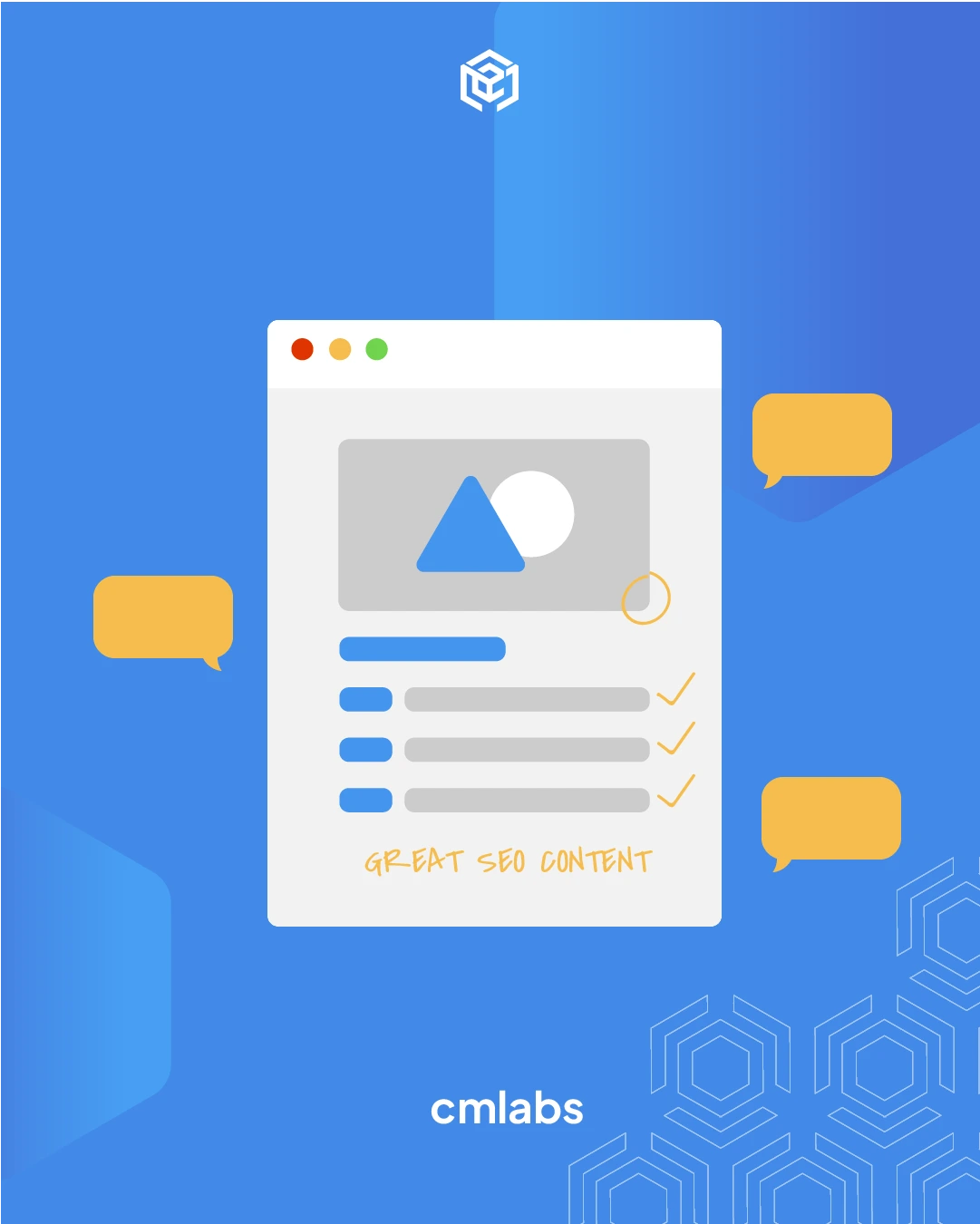We use cookies
This site uses cookies from cmlabs to deliver and enhance the quality of its services and to analyze traffic..
SEO SERVICES
Conduct in-depth technical website audits, strategically develop website projections, and increase your website authority.
ASO SERVICES
Elevate Your App’s Presence with Our Expert ASO Services – Boost Visibility and Drive Downloads!
WRITING SERVICES
We offer a variety of writing services to suit different business necessities. Reach broader audiences or lead specific industries? We've got you covered!
Get relevantly positive media exposure from bloggers and online publishers to increase your brand mentions on search engine results pages.
SEOlutions
A unified source of truth!
SEO & Digital Maternity Solution
SEO & Digital Maternity Solution: Leverage Cross-Platform Insights to Elevate Your Strategy with Expert Consultation
SEO & Digital Maternity Solution
Data Solution options:
Starting from Rp200 mio
Reinventing how a company get creative treatments
A new way to get your creative needs done. Agile team, efficient cost, and expedient way in a flexible yet scalable subscription plan!
Creative-as-a-Services
CaaS package options:
Based on Subscription
Pioneer in digital marketing software powerhouse
We’re excited to unveil our new range of Tech Solutions designed to drive your digital success. Whether you’re looking to enhance your website’s performance, streamline your tech stack, or unlock deeper insights from your data, we’ve got you covered.
Starting from Rp250 mio
Our Clients
Research and innovation center for digital transformation
Digital marketing combines technical skills and business knowledge at every stage. For marketing teams, improving budget management efficiency is crucial, as time is an invaluable resource that should be used wisely. At Sequence, we are dedicated to empowering you to optimize efficiency and strategic planning, ultimately enhancing the impact of your digital marketing efforts.
Subscription-based (IDR1,800/keyword)
Our Clients
BeyondSEO
References
SEO Tools for Webmasters
SEO Tools for Writers
SEO Tools
FIND THE SUITABLE PARTNERSHIP FOR YOUR COMPANY
Check out which cmlabs partnership program suits your company
WHITE LABEL SEO
for CorporateYour company is granted exclusive partnership rights to provide SEO services to our important clients, and we will provide a dedicated backend team to support your efforts.
AFFILIATE PROGRAM
for BizdevA new affiliate program is being introduced for skilled marketers and individuals with strong networks, offering commissions of up to 7% for generating profits independently.
DIGITAL AGENCY
for Marketing Partnerscmlabs is an essential partner for digital agencies, providing a unique selling proposition in Search Engine Optimization (SEO).
BACKLINK PARTNERSHIP
for Media / BloggerWe have a vast database of bloggers and media outlets across Indonesia, categorized by region and media type, giving our clients an edge in managing their media and SEO activities.
OFFICIAL TRAINING
We provide ongoing professional development and support to SEO professionals to ensure they are equipped to meet market demands.
JOIN AS CONTRIBUTOR
for Content WriterGreat opportunity for SEO Writers around the world. T&C applied!
ACADEMIC PARTNERSHIP
Through partnerships with universities in Indonesia, cmlabs has helped align academic curricula with industry demands.
Partnership
Sector & Industries
Tell us your SEO needs, our marketing team will help you find the best solution
As an alternative, you can schedule a conference call with our team
Schedule a Meeting?Contact
Survey
We use cookies
This site uses cookies from cmlabs to deliver and enhance the quality of its services and to analyze traffic..
Last updated: Nov 10, 2023

Customer Data Platform or CDP is a software specifically designed to collect, store, and integrate customer data from various sources.
In general, the purpose of CDP is to build a central database that stores all customer data, ranging from interactions to activities between customers and a brand.
This platform can help marketers collect data from various sources, including websites, mobile applications, web apps, chatbot conversations, and interactions through live broadcasts on various social media platforms.
The obtained data can come from customer interactions through customer service, transaction reports, and responses received from digital campaigns.
Having a Customer Data Platform is a superior strategy for companies seeking to optimize brand interactions with potential customers.
In general, this Customer Data Platform is used to create customer profiles, often referred to as buyer personas.
Customer Data Platform not only collects data but also manages it in a sophisticated manner to provide valuable insights and data for businesses.
After understanding “what is CDP”, you need to further explore some of the types that can be utilized for various business purposes. There are 4 types of Customer Data Platform in total, such as:
In the ever-changing business world, this type typically acts as a key player in unlocking the potential contained in customer data.
As the name suggests, this type focuses on using data for comprehensive analytical purposes.
Therefore, this type of data is frequently used to identify trends, automatically segment customers, and for predictive modeling.
Through in-depth analysis, companies can make smarter decisions and respond to market changes more quickly.
This type has the ability to send messages to facilitate personalized interactions with each customer.
As a result, companies can achieve higher levels of interaction and provide a user experience that better supports business success.
You can say that this type is the main foundation of the four existing types. This is mainly because it is the most basic stage where the platform collects customer data from various sources.
Therefore, the primary task of this type is to consolidate every obtained data into one system to facilitate access by various departments in a company.
This type understands that not all customers have the same customer experience (CX) or customer journey.
Therefore, in addition to analyzing market segments, this type is also capable of managing marketing materials and messages with a much more personal approach.
With this level of capability, companies have a greater opportunity to design marketing campaigns that are not only effective in general but also highly relevant to each individual customer.
Here are some of the most common types of customer data typically recorded in a Customer Data Platform.
Identity is the most crucial data in this data platform as it helps businesses identify and understand customers better. The identity data generally includes information such as:
As the name suggests, this type of data in the Customer Data Platform is usually detailed to help businesses get to know customers more deeply. Descriptive data includes:
Quantitative data can be utilized to measure campaign performance and understand customer preferences. This type of data shows how potential customers engage with a brand, including actions, reactions, and transactions. Some of the presented data generally includes:
The advantage of qualitative data is it helps the marketing team understand feedback, responses, opinions, and motivations of customers towards a product or brand.
Since qualitative data deals with quality, it can include information such as customer opinions, ratings, and recommendations provided by customers.
If the platform is capable of unifying various types of data from various sources, then what is the actual purpose of CDP?
In broad terms, its main function is to assist marketing teams in analyzing new facts about customers to later offer a more personalized experience to each customer. Discover more about it below!
Managing customer data can become easier and more organized when done on a centralized platform. As for this, CDP is the solution.
One advantage of utilizing CDP is that you can ensure much more organized customer data management.
With this data platform, a business can save time and resources in managing extensive databases.
In the current global communication era, especially, customer data security is a critical aspect that needs to be safeguarded as much as possible to avoid the risk of leaks or misuse.
This Customer Data Platform supports the analysis of customer data by involving a comprehensive understanding of customer behavior throughout the customer journey.
With four main components; data collection, sorting, storage, and analysis, it is undeniable that CDP indeed facilitates the entire analysis process.
With Customer Data Platform, you can overcome data silo issues because this platform works by combining customer and employee data in one medium.
This data platform can also ensure universal access so that all data can be accessed by any department member to obtain customer information quickly and efficiently.
This data platform enables businesses to collect data directly from customers, including information obtained from website visits and social media activities. This is beneficial to reduce data input errors if done manually.
The Customer Data Platform is also equipped with high-security settings and technology to help businesses protect customer data privacy and security from being misused by irresponsible parties.
With the help of this data platform, you can build in-depth customer profiles to better understand the needs and preferences of each individual and customer interacting with the brand.
A great and well-organized Customer Data Platform can help companies design digital marketing efforts with more effective cross-channel and omnichannel marketing.
The consolidated accuracy of data on CDP also allows a company to design better and more targeted marketing strategies for future implementation.
After you understand the concept, you might briefly recall another data storage platform with a similar function, DMP.
However, it should be noted that these two are almost totally different concepts. To avoid confusion in distinguishing CDP and DMP, you should understand their respective characteristics below:
WDYT, you like my article?
Couldn't find result for "Mulki" try to search with different keyword
Suggestion:
Tell us your SEO needs, our marketing team will help you find the best solution
As an alternative, you can schedule a conference call with our team
Schedule a Meeting?



cmlabs Jakarta Jl. Pluit Kencana Raya No.63, Pluit, Penjaringan, Jakarta Utara, DKI Jakarta, 14450, Indonesia
(+62) 21-666-04470These strategic alliances allow us to offer our clients a wider range of SEO innovative solutions and exceptional service.

Psst! Hey there, SEO Stats and Tools SEO company! If you've ever planned of conquering the Indonesia market, you've come to the right place!